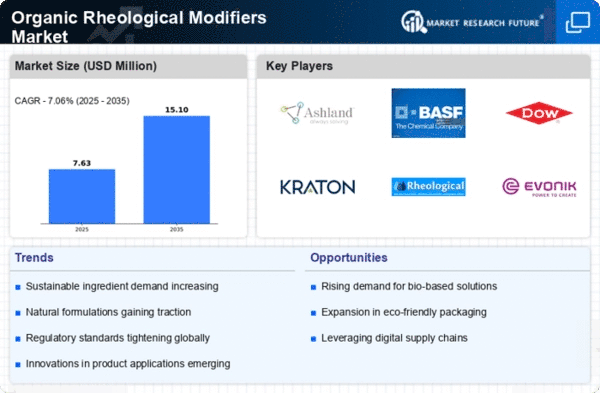Market Analysis
In-depth Analysis of Organic Rheological Modifiers Market Industry Landscape
Organic Rheological Modifiers (ORM) form a key section of the chemical industry, with several factors affecting production, demand, and market trends. Technological advances improve the performance and applicability of organic rheological modifiers, utilized in paints, adhesives, and personal care products. Organic Rheological Modifiers manufacturers remain ahead of technological changes by producing high-quality goods for many sectors.
Organic Rheological Modifiers are heavily influenced by global supply and demand. Domestic and international economic conditions affect ORM demand across sectors. Economic downturns limit industrial activity, lowering ORM demand, whereas economic prosperity boosts utilization in different applications. The market affects investment, production, and pricing, as well as the global economy.
Environmental factors significantly shape the Organic Rheological Modifiers market. Sustainability and eco-friendliness are driving demand for modifiers like ORM with low environmental effect. ORM product manufacturers are under pressure to use greener production methods and enhance environmental profiles. In an environmentally concerned market, ORM providers that prioritize sustainability may have an advantage.
Due to their importance in many industries, Organic Rheological Modifiers are highly competitive. Manufacturers must differentiate through quality, cost-effectiveness, and innovation. Differentiation methods like creating ORM formulations for specific applications or improving performance are vital to market share. Companies must continuously research and develop to stay ahead of the competition and suit client needs.
Trade policies and geopolitics affect Organic Rheological Modifiers markets. Tariffs, import/export rules, and geopolitical concerns can affect the global supply chain and ORM availability and cost. Manufacturers must monitor trade policies and geopolitics to alter their strategy and reduce global market risks.
Standards and regulations shape the Organic Rheological Modifiers industry. Compliance with safety, quality, and environmental standards is essential for market acceptance. Proactively addressing regulatory issues helps ORM companies retain marketability and good relations with customers and regulators.
Consumer choices and market developments affect Organic Rheological Modifiers market dynamics. Consumer preferences for health and safety, environmental sourcing, and changing manufacturing processes can affect ORM demand. These developments require manufacturers to adapt their products to changing consumer expectations and market trends.


















Leave a Comment